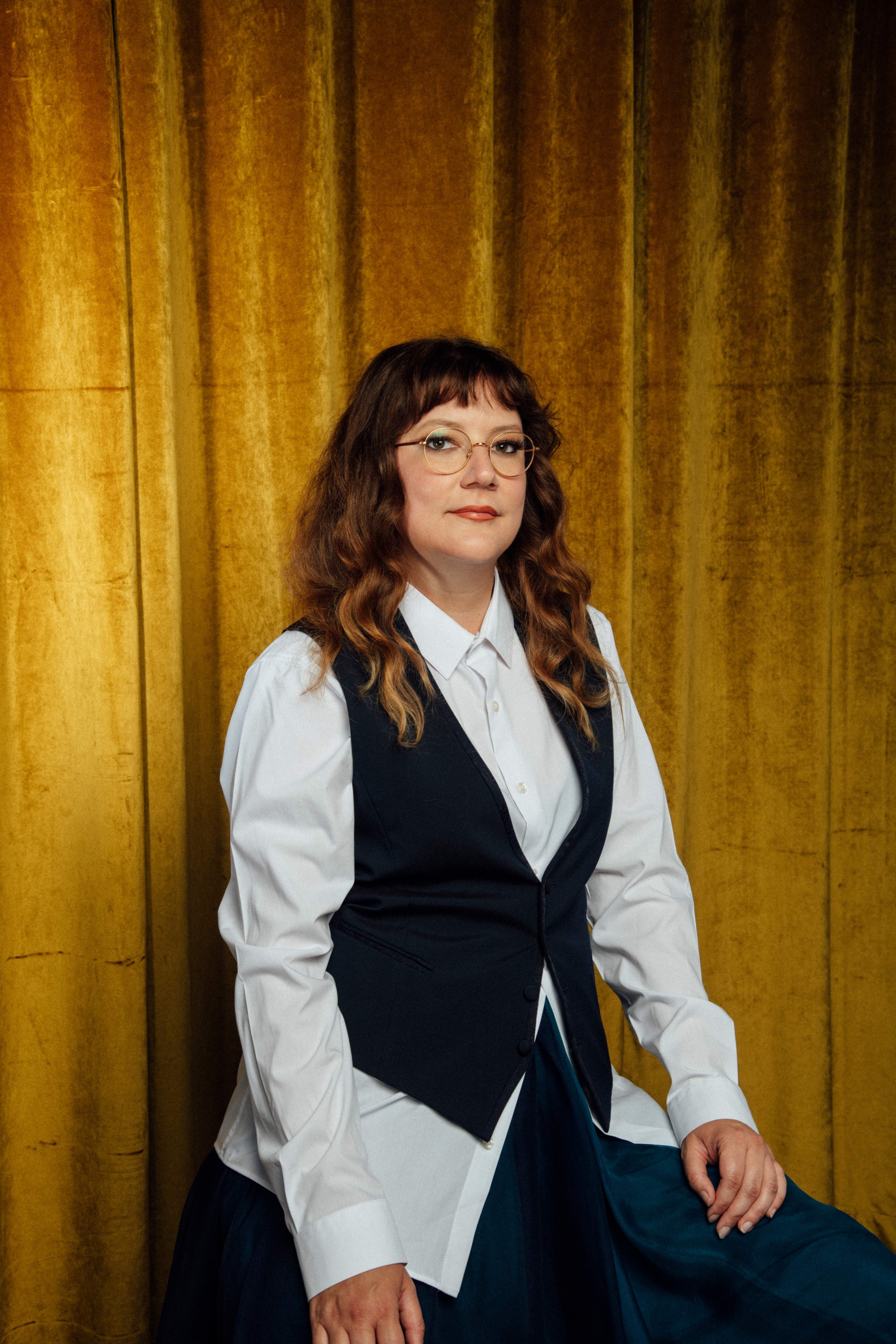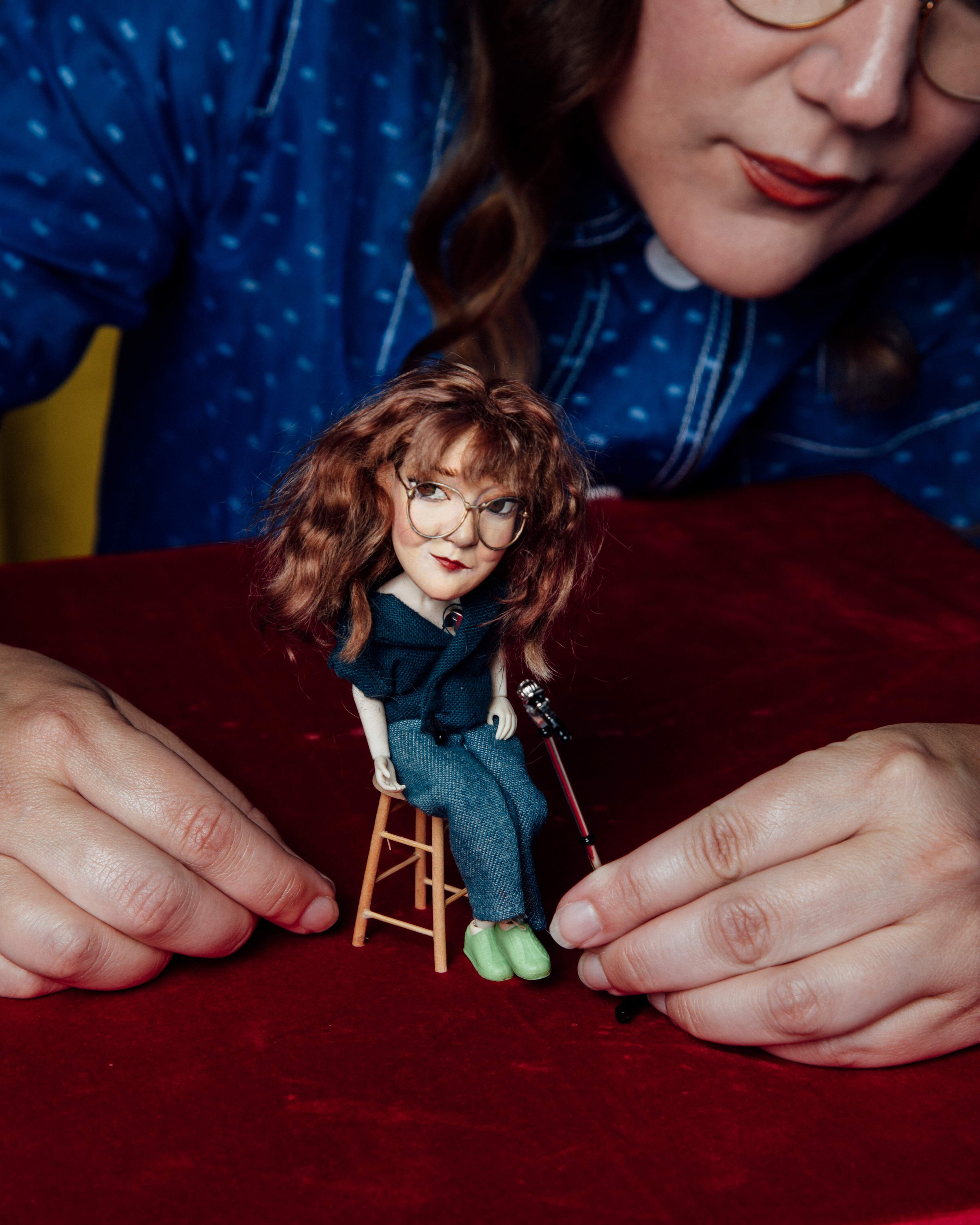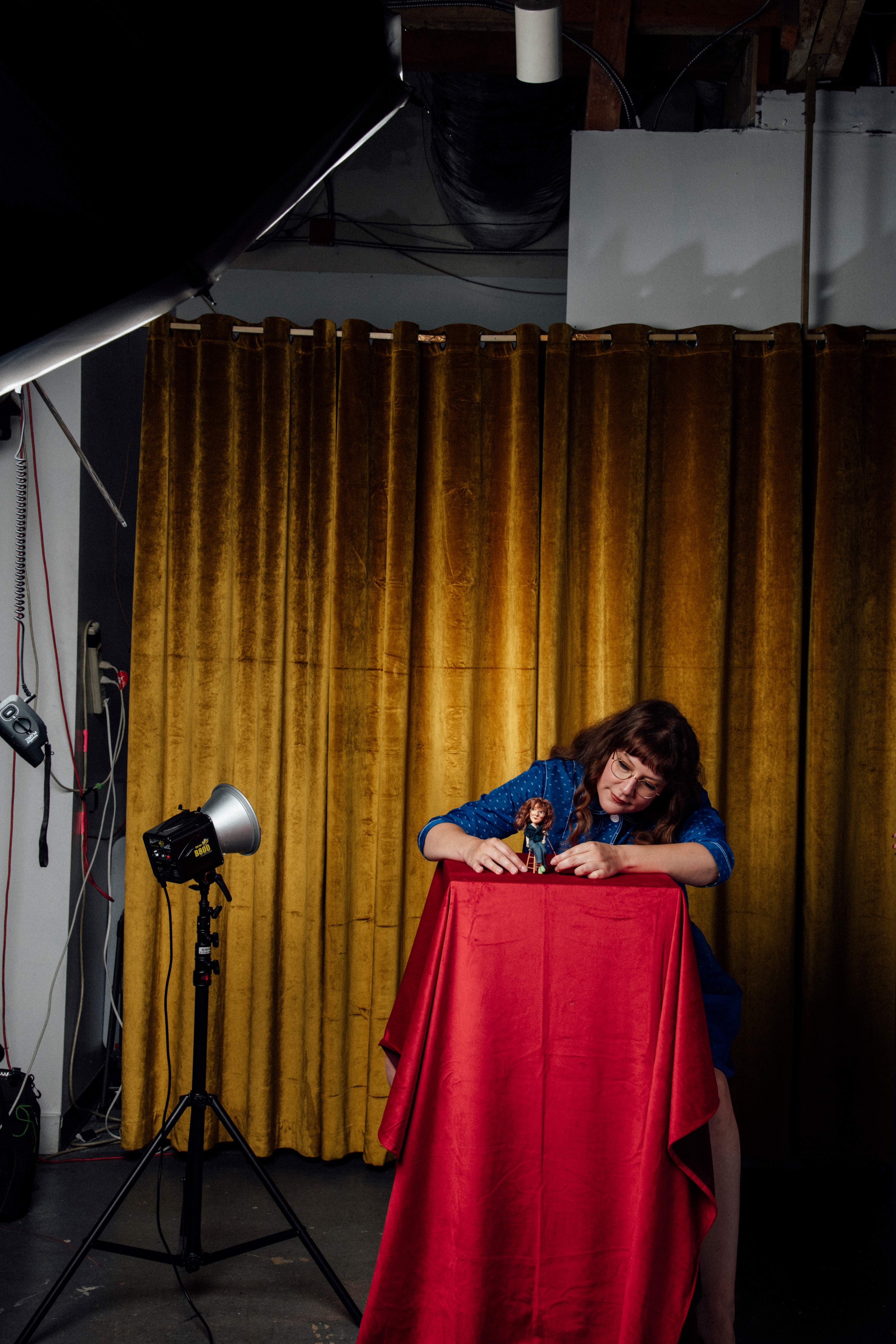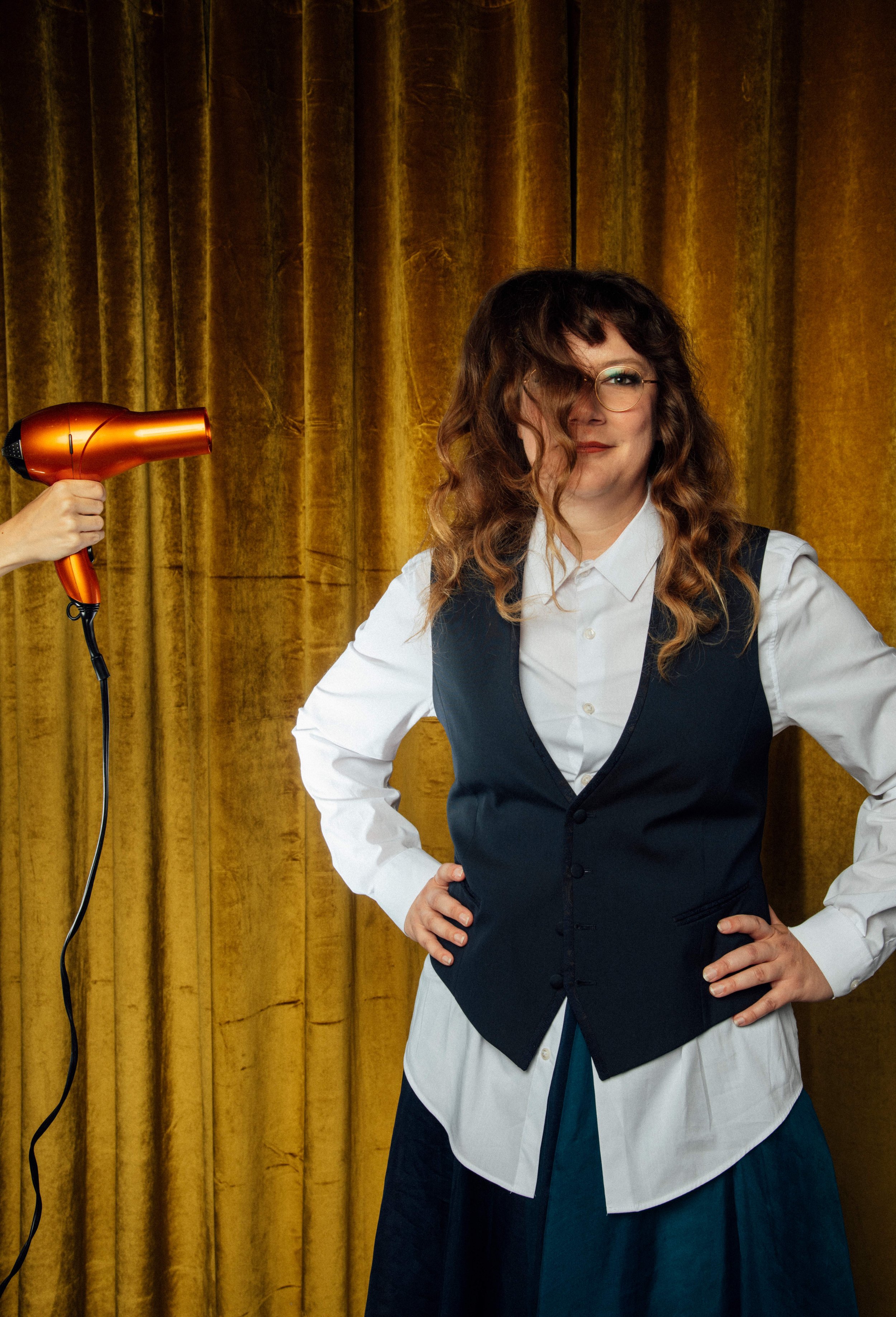Sara Schaefer: Doing Whatever She Wants
⤏ COMEDIAN SARA SCHAEFER ON FITTING IN, THE SIMILARITIES BETWEEN CULTS AND COMEDY, AND HER SHOW, GOING UP
⤏ IN CONVERSATION WITH HANNAH BENSON
⤏ PHOTOGRAPHY BY HADLEY ROSENBAUM
⤏ STYLING BY BRANDEN RUIZ | ASSISTED BY KELLY ROSE LOVE
⤏ MAKEUP BY GINA SCARSELLATO
To be frank, I would totally let Sara Schafer indoctrinate me into a cult. The comedian, artist and writer is known notably for her Comedy Central stand-up, Emmy-winning late-night television work and satirical internet sketches. She is currently touring her show, Going Up, a fake seminar on how to ‘make it’ in comedy with Schaefer in the instructor role. She is also in full-swing, double-striking!! Her eloquence and humor is something to behold whether she’s onstage or chatting with me over Zoom. To hear her talk is to be lucky.
HANNAH BENSON: Let’s begin with Going Up, how do you describe your show?
SARA SCHAEFER: I’ve been describing it as a letter to my younger self when I was starting out, telling younger me all the things I wish I had known when I started. In the beginning, I thought the only thing that mattered was figuring out how to be funny. I wish I had known the things that have nothing to do with jokes that you have to overcome and encounter the unfairness, sometimes the toxic elements of the comedy business. It’s me reckoning with those things and commenting and criticizing, but also celebrating. It’s also incredibly silly. I incorporate miniatures and dolls into the show as well as music. It’s pretty much everything I’m into and everything about me put into a show.
HB: The show’s name plays on the Scientology term, “going clear.” Tell me more about that satirical aspect of the show.
SS: I had noticed over the past ten years or so in comedy —as I got deeper into it and explored all corners of the business— how so much of the language and attitudes took on a touch of that cultiness. I read this amazing book called, Cultish by Amanda Montell. She approaches it from a linguistic point of view and how cults use language to influence, coerce and control the members. I gained a lot of insight from reading the book on ways groups use language to name outsiders, to have inside jargon that unites the group and makes us feel like we have special knowledge. And comedians do that. We have our own jargon and shorthand of things. We talk about outsiders, we call them “Normies” and I play with all of that. I really exaggerate that in the show; I go full-blown, “What would it be like if you walked into the Comediosity (the show’s name for comedy) headquarters? What would the levels be? What would the language be?”
HB: Tell me more about the comedy and cult similarities.
SS: One of the things I loved about that book —Cultish—is a term I had never heard before. It’s called a “thought-destroying cliche.” Cults use thought-destroying cliches to dispel doubt and control people. An easiest example of a thought-destroying cliche is when something really tragic happens, and people in Christianity will say, “Everything happens for a reason. God has a plan.” What if my child died of cancer? Is that part of God’s plan? It’s meant to make the other person just quiet down and not complain. Thought-destroying cliches can also kick back on you and blame you.
In comedy, one of the obvious thought-destroying cliches is, “Funny is funny.” Comedy is a meritocracy. It’s “Just work on your jokes instead of complaining about abuse in the business.” “Maybe if you would just focus on your comedy you wouldn’t be worrying about diversity, Sara.” “It’s not because you're a woman, it’s because you’re not funny.” You hear that and as a comedian you think maybe they’re right. “Be undeniable.” That’s one of the pieces of advice they’d give to women comics, especially when I was starting out. “You just gotta be undeniable.” But that’s crazy because there are comedians that are very rich and famous that have never made me laugh, because at the end of the day, comedy is subjective. What’s funny to one person is going to be unfunny to another. That's an element I play with in the show and I also add in some other made-up cliches.
HB: I want to say, thank you for making this show. The last few years I personally have been turned-off by comedy for a lot of the reasons you bring up in Going Up.
SS: Thank you for saying that. I’ve gotten that reaction a bit from people. The show is very ‘inside’ and so comedians and followers of comedy get every single, little detail. For those who aren’t huge comedy nerds, I’ve had to work on the beginning of the show to set the scene. It’s like I’m onboarding everybody. What I’ve noticed from the regular people coming is that they felt seen. They related to a lot of it because the ultimate emotional feelings of the show are very relatable, such as feeling like an outsider in your own world. How do you survive in a culture —that’s very American— that says, "Everybody can be rich and famous, you just have to be really hardworking and talented!” The gaslighting of not acknowledging the real structural problems, the real abuse that happens, the real bias and discrimination and the lie of the American dream that “anybody can do it” is the tone I take on as this character. It’s me saying, “You’re gonna love it!’ while describing horrific stuff. I’m still tweaking it but overall I’ve never felt more clear on the statements I’m trying to make with a project. I’ve never felt more like an artist than I do right now. I have an actual vision in layers and I know what I’m doing with this.
“For many years I tried to fit into the comedian mold and be a certain way to get ahead, to make a living, to survive, to be accepted by my fellow comedians. I kept thinking, ‘I have to do it this way and I have to check this off my list in order to be accepted and be seen as a ‘real’ comedian.”
HB: It’s just like you said earlier, how the show is the accumulation of everything you’re into, when your art is something you love —it shows.
SS: Some people don’t realize until the end that every single visual they saw was handmade by me. It was me being frustrated with the comedy business, being angry at how the chips fell after Me Too, after the lockdowns and quarantine, the choices that a lot of comedians and gatekeepers have made to show their character and to show what matters to them. In a business where we’re told all the time, “We’re a family! Comedians are family!” I could not have felt less like a family.
For many years I tried to fit into the comedian mold and be a certain way to get ahead, to make a living, to survive, to be accepted by my fellow comedians. I kept thinking, ‘I have to do it this way and I have to check this off my list in order to be accepted and be seen as a ‘real’ comedian.’ Everyday people think they can tell you whether or not you’re a comedian. They will put comedian in quotes. There’s this undermining that says, “You’re not actually funny so you’re not a real comedian.” That messaging is used as a weapon. Comedians use it amongst each other. The fans use it against people they don’t like. It’s a way of denying someone the thing they’ve worked so hard to do and it’s so hard to make a living as a comedian, so that kind of commentary can be very hurtful when you feel like a fraud to begin with. It’s all just hanging by a thread at all times. And you’re up on stage and you bomb one night you’re in head thinking, “What am I doing? Why am I doing this? I suck. I’m not a comedian, I should quit.” [Going Up] came from me thinking, “Fuck all that. I’m going to do what I wanna do.”
When I first started out in comedy, I was extremely free creatively. I would do songs, powerpoint presentations, tell little stories that weren’t fully-formed jokes. I was trying to find myself and I started in New York, which is a pretty straightforward comedy scene. There’s strong pressure there to be just a “normal” stand-up: get up there and tell your jokes and don’t be weird. There were a lot of weirdos in New York, of course, and I loved and gravitated towards them, but at some point I felt a pressure to fit into that narrow definition of stand-up comedy, so I let all that other stuff go. I’m glad I did, because I figured out how to write a joke, how to just be me on stage with nothing else and be funny and in control of an audience. Cut to twenty years later and I thought, I just wanna go back to being that free, young, bold, fearless, idiotic, naive girl again and just do what makes me laugh.
HB: I wanted to know —since this in many ways is a letter to your younger self— if you had any advice for those entering the ‘cult of comedy’ and how to find safe spaces. These can be writers’ rooms, places to perform, improv groups. What are the signs?
SS: That’s such an interesting question, because the word “safe” means different things. I think there are safe spaces creatively where you are allowed to be yourself and be a true artist in that place and not be shamed for your way of doing it. To be free to fail. In the comedy scene there are actually a lot of unsafe spaces in that respect. Comedians can be really critical of each other and judgy of how you’re telling jokes, the way you’re telling jokes, the way you got ahead. They can get very angry if you cut corners in their mind. It’s all so silly, because there’s no set path.
Then there’s also physical safety, and emotional safety from people who could hurt you and we have obviously had a lot of problems with that in comedy. There are a lot of places that I actually don’t feel safe in the comedy scene from over the years. Do I think that I’m going to be assaulted when I go to a certain comedy club? That’s not really what I mean. What I mean is, if something did happen to me or someone I know, I don’t feel that anyone would protect me or listen to me if I said anything. And that makes you feel unsafe. There are clubs that have continued to book known pedophiles, abusers and rapists. That’s a huge problem for me once I know that a place has done that, intentionally. But no one cares if Sara Schaefer boycotts a club. No one’s saying, “Wow, we gotta change everything, Sara Schaefer’s not coming by.” I’m not the person selling out the club, so I don’t have that kind of power, but I also have integrity and my own personal feelings of safety and not wanting to be around people like that. The people in power though, I don’t know what they’re doing, in LA can they not find 52 non-predatory comedians that can sell out 52 weekends in a year?
“The best lineups offer different perspectives and give everybody a variety of world views to learn about, laugh about, to relate to, to have empathy for. That to me is what the purpose of all of this is.”
HB: There are truly thousands of people lined up to take their spot.
SS: Right, and that’s the message that I’ve received my entire career, which is: ‘You don’t like it? Well get out of the way, someone will take your place.’ Why doesn’t that message apply to those people? That’s one of things that drives me totally crazy and it’s something I explore in the show as well. I was once asked to do a show —a paid gig in LA— and the person asking me said, “Oh yeah it’s gonna be you, you and you..” And then they mentioned someone who I have heard raped at least two people and my face fell and I said, “Oh, I can’t do the show if he’s on the lineup. I know things about him that I would rather not be on a lineup with him.” And he said, “Okay, we will get you on at another time.” He didn’t ask further questions, because he knew! He fucking had heard it too! And was I ever asked to do the show again? No.
Writers’ rooms are similar. There’s HR you could call, but it’s not that simple. There’s a lot of peer pressure in the writers’ room to fit in and not complain. I know firsthand you can lose out on work, because you’re seen as a “shrill bitch” who complains and makes all the other people in the room feel guilty. There’s pressure to not speak up. In a writers’ room, a lot of times I’ve been the only person who’s not a white guy or just not a man. As a cis, straight, white woman I only got the ‘woman’ mark on that list and what’s funny is if I’m the only other in the room, I suddenly become the voice for every other marginalized voice. They will turn to me and go, “Sara, is that offensive to Black people if we say this or that?” And I think, ‘Hey, you know what would make this easier? If we had a Black person working in here. And not that they have to answer for it either but at least we’d all have different perspectives to talk about this more freely.’
Writers’ rooms are obviously separate conversations than stand-up clubs, but at the end of the day the purpose of these workspaces is to create comedy, art, and entertainment. I believe the best product comes from a diverse lineup of either writers or comedians. The best lineups offer different perspectives and give everybody a variety of world views to learn about, laugh about, to relate to, to have empathy for. That to me is what the purpose of all of this is.
HB: You’re currently working extremely hard for this purpose. As a member of the WGA and SAG-AFTRA, you are currently striking. What is morale like on the picket lines right now?
SS: I'm a strike captain for the WGA, and I won't lie, it's been stressful and exhausting, especially in the summer heat. But the spirit on the picket line is very strong. It has also been so incredibly inspiring and validating. Every person I've met has talked about how the state of our industry is impacting their life. Things I thought were "just me" or a personal failure are actually industry-wide problems, many of which were actively created by the studios.
HB: What are your predictions for the strike as we move into month three for WGA?
SS: I really don't know when or how this will end. But what I do know is that our solidarity, across all the Hollywood unions, is rock solid. We aren't going to stop until the studios return to the table and give us what we are owed. Because it's not that we're asking for "more." We're asking for what was ours to begin with —earnings that they have chipped away at, or even completely obliterated over the years. I do believe we will win.
HB: After Going Up's run, what's next?
SS: That's the question of the century! I don't remember a time in my twenty year career feeling more unclear about my future. I'm on strike. My husband and I just put our stuff in storage and we are going to travel [and] wander for a while. Everything is up in the air. That's why Going Up has been such a special thing for me. It's been the constant through all of this upheaval and I'll keep following it wherever it takes me. I don't know if I'll get to keep doing it, or if it will take on a different form. I have dreams about things I want to do with it, and I hope they take shape!




